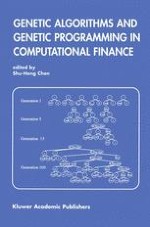2002 | OriginalPaper | Buchkapitel
A Model of Boundedly Rational Consumer Choice
verfasst von : Thomas Riechmann
Erschienen in: Genetic Algorithms and Genetic Programming in Computational Finance
Verlag: Springer US
Enthalten in: Professional Book Archive
Aktivieren Sie unsere intelligente Suche, um passende Fachinhalte oder Patente zu finden.
Wählen Sie Textabschnitte aus um mit Künstlicher Intelligenz passenden Patente zu finden. powered by
Markieren Sie Textabschnitte, um KI-gestützt weitere passende Inhalte zu finden. powered by
The paper presents an extended version of the standard textbook problem of consumer choice. As usual, agents have to decide about their desired quantities of various consumption goods, at the same time taking into account their limited budget. Prices of the goods are not fixed but arise from a Walrasian interaction of total demand and a stylized supply function for each of the goods. After showing that this type of model cannot be solved analytically, three different types of evolutionary algorithms are set up to answer the question whether agents’ behavior according to the rules of these algorithms can solve the problem of extended consumer choice. There are two important answers to this question: a) The quality of the results learned crucially depends on the elasticity of supply, which in turn is shown to be a measure of the degree of state dependency of the economic problem. b) Statistical tests suggest that for the agents in the model it is relatively easy to adhere to the budget constraint, but that it is relatively difficult to reach an optimum with marginal utility per Dollar being equal for each good.
